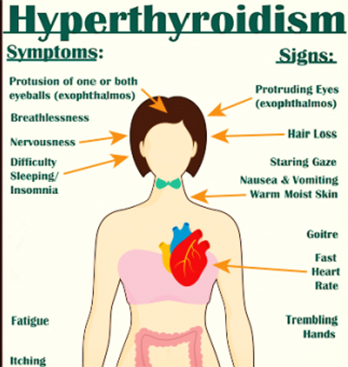Thyroid disorders affect over 4% of American citizens and are often misdiagnosed as sleep disorders or anxiety, leading to further health issues. If you are dealing with a thyroid disorder, the most important thing you should do, is to make some dietary changes.
Hormones have a role to support the communication between every function in
the body, so any imbalance can be the cause of a list of health issues.
The thyroid gland affects almost all of our metabolic processes, and these
thyroid disorders can range from a small, harmless goiter (abnormal
enlargement of the thyroid gland) that does not require any treatment,
to life-threatening cancer. The most common thyroid problems involve abnormal
production of thyroid hormones: hyperthyroidism, and hypothyroidism.
Please see the below video from WebMD explaining the basics of the thyroid gland
Nutrients
As with all organs in the body, a regular intake of key nutrients are required to keep the thyroid gland healthy, like zinc and selenium, so if you want to treat this condition, make sure the levels of these nutrients are optimized. We have found the best to be Innate Response Formulas which you can find on Amazon, just click here: Selenium *
Hypothyroidism

Hypothyroidism
is a condition of an underactive thyroid,
which is characterized by weight loss, fatigue, slow metabolism, constipation,
and brain fog. It is most often a result of:
Hashimoto’s thyroiditis a type of
hypothyroidism that occurs when the immune system does not recognize the
thyroid gland cells, or their enzymes and inhibits the production of the thyroid
hormone. This is caused by:
- Exposure to excessive amounts of iodide. Cold and sinus medicines, the heart medicine amiodarone, or certain contrast dyes given before some X-rays, or MRIs, may expose you to radioactive Iodine.
- You may also be at greater risk for developing hypothyroidism if you have had thyroid problems in the past.
- The use of certain drugs
- Removal of the thyroid gland (the thyroid may have been surgically removed or chemically destroyed)
Please see related article on the link to thyroid cancer and radioactive Iodine in Chernobyl
Foods to eat for Hypothyroidism
The following foods are incredibly beneficial in case you suffer from hypothyroidism:
Flax seeds
Asparagus
Mushrooms
Cabbage
Cauliflower
Broccoli
Nuts and nut butters
Legumes
Eggs
Grapefruits
Peaches
Spinach
Garlic
Sesame seeds
Swiss chard
Coconut milk
Avocados
Ghee
Fish
Grass-fed meat
Summer squash
Yogurt
Cottage cheese
Hyperthyroidism

Hyperthyroidism is developed when the thyroid gland is hyperactive, elevating the levels of the thyroid hormone.
The most common causes include:
Toxic adenomas: Nodules develop in the thyroid gland that release thyroid hormones, upsetting the body’s chemical balance
Graves’ disease: The excessive production of thyroid hormones.
Subacute thyroiditis: Inflammation of the thyroid that urges the gland to “leak” excess hormones, leading to temporary hyperthyroidism that in most cases lasts for a few weeks but may persist for months
Pituitary gland malfunctions or cancerous growths in the thyroid gland
Which leads to symptoms such as anxiety, muscle weakness, trouble sleeping, nervousness, and accelerated metabolism.
Foods to eat for Hypothyroidism
If you are suffering from hyperthyroidism then make sure you increase the intake of the following foods:
Sweet potatoes
Radish
Turnips
Brussels sprouts
Almonds
Spinach
Mint
Millet
Broccoli
Cabbage
Basil
Marjoram
Peaches
Mustard
Watercress
Pears
Rosemary
Oregano
Blood tests
Thyroid disorders are usually diagnosed via a blood test.
More info
Because the endocrine system has an integrated nature, if you suspect a thyroid disorder, you should also go and test your sex hormones.
Please also see this related article on the chemo drug Asparaginase, that can now be found in Potato chips
Thyroid Disease or Menopause?
According to the American Association of Clinical Endocrinologists (AACE), millions of women with unresolved menopausal-like symptoms, even those taking estrogen, may be suffering from undiagnosed thyroid disease. While symptoms such as fatigue, depression, mood swings, and sleep disturbances are frequently associated with menopause, they may also be signs of hypothyroidism.
A survey done by the AACE showed that only one in four women who have discussed menopause and its symptoms with a physician, was also tested for thyroid disease. The thyroid plays a role in regulating overall body metabolism and influences the heart, brain, kidney, and reproductive system, along with muscle strength and appetite.
If you are experiencing symptoms of menopause and the symptoms persist despite appropriate therapy, ask your doctor to do a thyroid screen (TSH). A blood sample is all that is needed to make the initial diagnosis of hypothyroidism and treatment is easily achieved with thyroid replacement therapy.
Sources: www.healthyfoodhouse.com WebMD
*CAUTION: Only take the selenium and chromium from Innate Response Formulas at the high serving. Absolutely do NOT take other selenium and chromium supplements in high quantities, as they may cause serious harm!
Love and Light
Healing Oracle
—
Love and Light
The Healing Oracle Team
Please join our growing numbers on MeWe: Healing Oracle
Also join us on Twitter | YouTube
Global Petition
Please sign our global petition against enforced vaccinations The intention of this petition is to present 5 million signatures to each President, Prime Minister, Health Minister and heads of state worldwide.
Vaccines are a global problem and need to be tackled on a global level.
If we stand as one, we have a chance of saving the children of the future.

